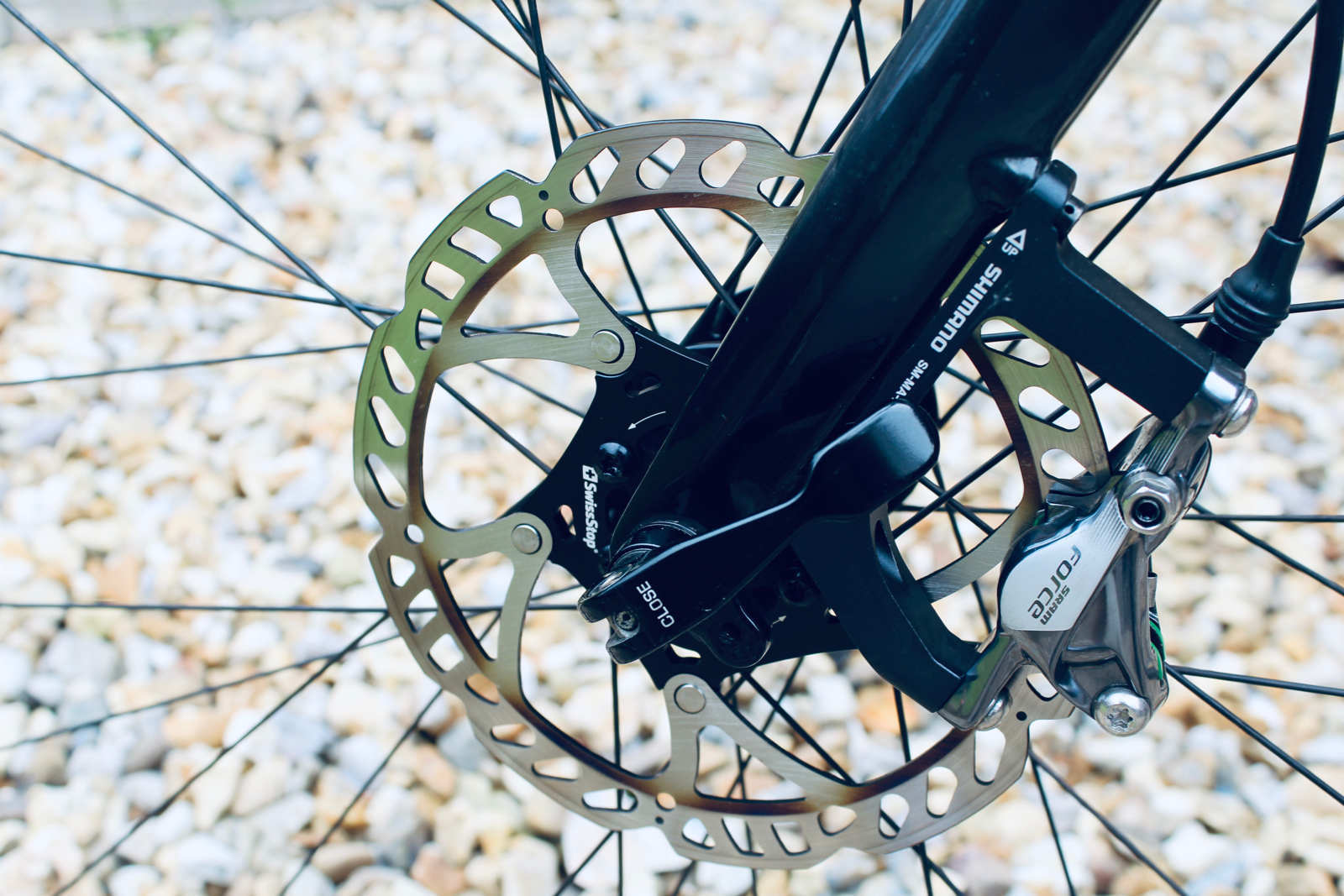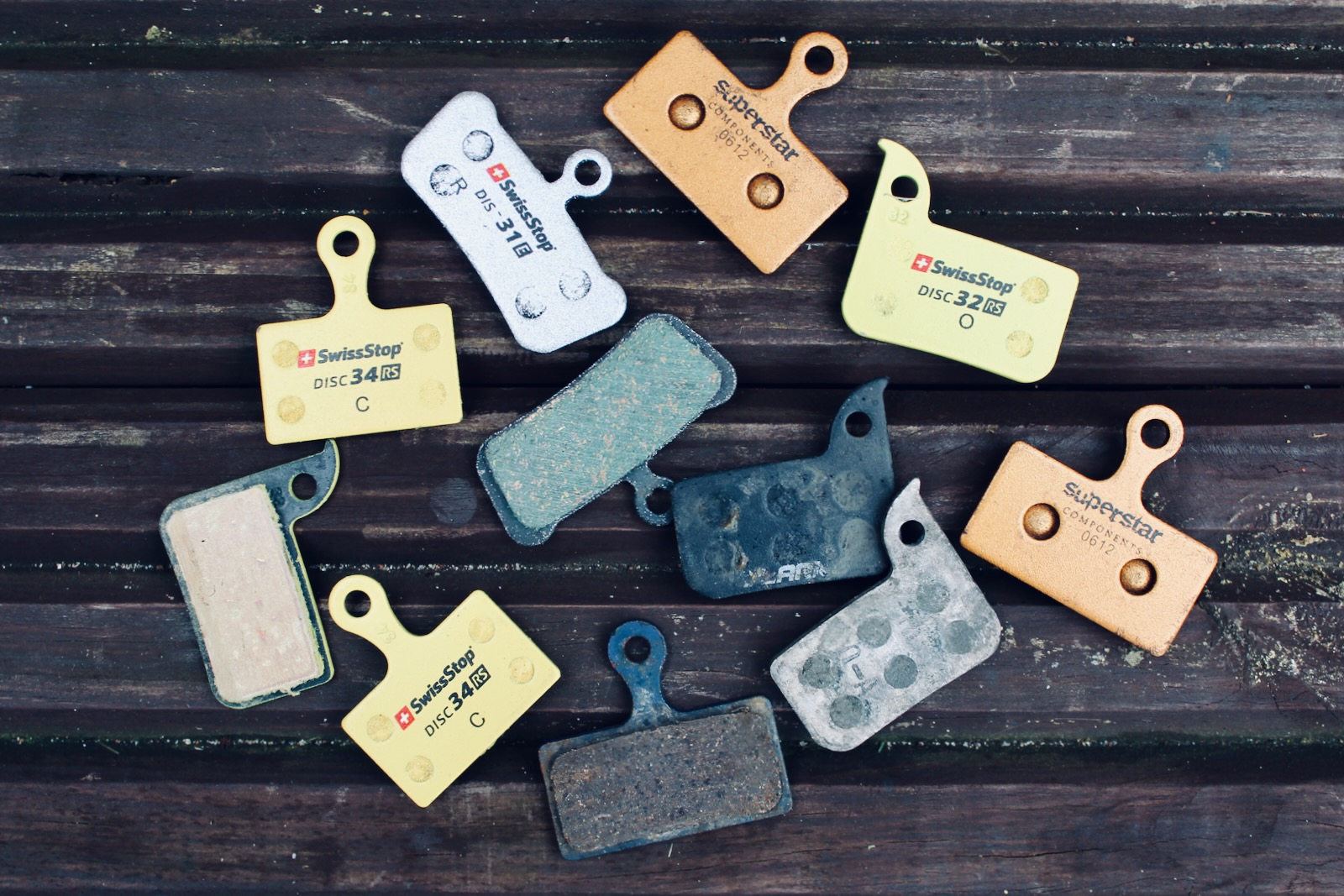SwissStop Disc Brake Pads Comparison Test Review – Are All Disc Brake Pads Made Equal?
The market for disc brake pads for gravel bikes, mountain bikes and road bikes is saturated; there are hundreds of different brands producing disc brake pads claiming to last longer and perform better than the competition. So, what is the difference between a set of low cost disc brake pads from eBay/Amazon versus the high-end pads from SwissStop? Are SwissStop disc brake pads worth the extra money?
To find out, I have been doing some extensive disc brake pad testing over the last few months. October to February is obviously a period of wet winter riding, and I have been testing the following list of brake pads on road, gravel and mountain bikes—to create the ultimate test for any disc brake set-up.
The disc brake pads on test:
To find out, I have been doing some extensive disc brake pad testing over the last few months. October to February is obviously a period of wet winter riding, and I have been testing the following list of brake pads on road, gravel and mountain bikes—to create the ultimate test for any disc brake set-up.
The disc brake pads on test:
- SwissStop Disc 34 RS (Shimano Road/Gravel)
- SwissStop Disc 32 RS (SRAM Road/Gravel)
- SwissStop Disc 31 E (MTB SRAM Avid)
- Superstar Sintered Shimano Road Disc Brake Pads (Shimano Road/Gravel)
- SOMMET Resin and Semi-Metallic Disc Brake Pads (SRAM Road/Gravel)
- Clarks Sintered Disc Brake Pads (MTB SRAM Avid)
All disc brake pads were used with top quality SwissStop Rotors
The disc brake pads above range in price from £6.85 (SOMMET) to £26.95 (SwissStop RS) at the time of writing. That is close to a four-fold price difference, so what is the performance difference? Do you get what you pay for?
Disc brake pads can be ranked on three obvious criteria: 'Heat Tolerance', 'Longevity', and 'Modulation'. In mixed conditions, over several months of riding, I tried to compare the above six sets of disc brake pads to see what came out as the best option, in my opinion.
The disc brake pads above range in price from £6.85 (SOMMET) to £26.95 (SwissStop RS) at the time of writing. That is close to a four-fold price difference, so what is the performance difference? Do you get what you pay for?
Disc brake pads can be ranked on three obvious criteria: 'Heat Tolerance', 'Longevity', and 'Modulation'. In mixed conditions, over several months of riding, I tried to compare the above six sets of disc brake pads to see what came out as the best option, in my opinion.
Heat Tolerance
Heat tolerance may not seem overly relevant on a winter disc brake pad test, however the build-up of heat in a disc brake pad still occurs on long winter descents; with overheated pads giving off a burning smell and beginning to glaze over—which leads to a dramatic reduction in braking performance.
The cheaper pads within the line-up (the Sommet and Clarks pads) showed notable signs of over-heating on long road descents; exhibiting brake-fade and sometimes squealing as the pad glazed over and slipped against the disc. By contrast, the SwissStop pads showed no signs of overheating, and continued to perform consistently even on the longest road and MTB descents.
The worst experience I have ever had with disc brake pads is that the overheating gets so severe that the pad has melted and fallen off the backing metal; this did not occur on this test, but the experience was with a set of unbranded Amazon/eBay pads… and needless to say, it was quite terrifying—leaving me with zero braking function.
I used the SwissStop RS and E pads on my gravel bike and mountain bike throughout the winter months, as well as on my road bike for numerous heavily laden bike tours. The pads last longer than anything else I have tried.
Typically, I find a SwissStop set of pads such as the 'E model' will last around 5000 kilometres on my gravel bike in the worst winter weather, in comparison to around 2000 kilometres for a set of Clark’s or Superstar disc brake pads. Similarly, on the road, the SwissStop RS pads last at least twice as long as Clark's brake pads fitted on the same hydraulic disc brake system at the same time of year.
SwissStop pads all exhibit exceptionally good modulation performance thanks to the quality of the pad compounds. A quality compound provides the sought-after balance of gentle pad engagement, with a firm and consistent feel. All the SwissStop pads provided significantly better brake feel than the cheaper competition; the worst modulation was with the Sommet pads, which felt 'grabby' and noisy.
SwissStop pads do seem to have a higher heat tolerance, almost twice the longevity, and a consistently better feel and performance than the cheaper competition.
Overall, then, it can be concluded that while you could purchase three pairs of some of these cheaper pads for the price of one pair of SwissStop pads; the purchase of a SwissStop pad set will deliver better performance and potentially better value in the long run.
The cheaper pads within the line-up (the Sommet and Clarks pads) showed notable signs of over-heating on long road descents; exhibiting brake-fade and sometimes squealing as the pad glazed over and slipped against the disc. By contrast, the SwissStop pads showed no signs of overheating, and continued to perform consistently even on the longest road and MTB descents.
The worst experience I have ever had with disc brake pads is that the overheating gets so severe that the pad has melted and fallen off the backing metal; this did not occur on this test, but the experience was with a set of unbranded Amazon/eBay pads… and needless to say, it was quite terrifying—leaving me with zero braking function.
Longevity
If there is one main criticism of SwissStop in the marketplace, it is the price. However, when you consider longevity versus cost, SwissStop may fare better than most in terms of delivered value.I used the SwissStop RS and E pads on my gravel bike and mountain bike throughout the winter months, as well as on my road bike for numerous heavily laden bike tours. The pads last longer than anything else I have tried.
Typically, I find a SwissStop set of pads such as the 'E model' will last around 5000 kilometres on my gravel bike in the worst winter weather, in comparison to around 2000 kilometres for a set of Clark’s or Superstar disc brake pads. Similarly, on the road, the SwissStop RS pads last at least twice as long as Clark's brake pads fitted on the same hydraulic disc brake system at the same time of year.
Modulation
If you have not heard of the term ‘brake modulation’ before, it can most easily be described as how consistent the feel and bite of the brake is throughout the brake lever pull. Poor brake modulation leads to a sudden bite as the pad engages the rotor; good pad modulation will provide a progressive braking feel and progressive performance.SwissStop pads all exhibit exceptionally good modulation performance thanks to the quality of the pad compounds. A quality compound provides the sought-after balance of gentle pad engagement, with a firm and consistent feel. All the SwissStop pads provided significantly better brake feel than the cheaper competition; the worst modulation was with the Sommet pads, which felt 'grabby' and noisy.
Overall SwissStop Comparison Review
To sum up, SwissStop pads cost at least twice that of the cheaper pads in this test, and are often 50 percent more expensive than the Shimano or SRAM own-brand pads. Is it worth it?SwissStop pads do seem to have a higher heat tolerance, almost twice the longevity, and a consistently better feel and performance than the cheaper competition.
Overall, then, it can be concluded that while you could purchase three pairs of some of these cheaper pads for the price of one pair of SwissStop pads; the purchase of a SwissStop pad set will deliver better performance and potentially better value in the long run.






Just bought lastest Raleigh 2.0 model and don't know a damn thing about disc brakes . As usual your explanations are a big help in solving a biking mystery . Thanks ! That photo tells a lot too . Happy Trails .
ReplyDelete